____________________
Long before Dorothy dropped in, two other girls meet in the Land of Oz. One - born with emerald green skin - is smart, fiery and misunderstood. The other is beautiful, ambitious and very popular. How these two unlikely friends end up as the Wicked Witch of the West and Glinda the Good Witch makes for the most spellbinding new musical in years.
____________________
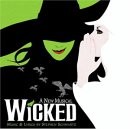 That's how the synopsis reads on the website for Wicked, the musical. And, like most synopses, it is woefully inadequate. The difficulty of writing a review or a synopsis is to avoid giving away too much of the plot so that people will still want to see it. This musical is about the origins of evil, what it means to be good, the mislabelling of people, tolerance, and of course, love and conflict.
That's how the synopsis reads on the website for Wicked, the musical. And, like most synopses, it is woefully inadequate. The difficulty of writing a review or a synopsis is to avoid giving away too much of the plot so that people will still want to see it. This musical is about the origins of evil, what it means to be good, the mislabelling of people, tolerance, and of course, love and conflict.I'll be honest...I'm very picky about what musicals I like. The genre has always baffled me. When I was a child, I enjoyed watching them, but had a quirky way of looking at them. I'd watch them and instead of paying attention to the performers, I used to stare at the people who would walk around in the background while the performers did their stuff. I used to wonder why these people didn't seem to notice the well-choreographed numbers and singing around them and walked around like nothing out of the ordinary was happening. Then, I would imagine what it would be like in real life if suddenly, you were waiting for a bus, or standing in line somewhere, and half the people around you broke into some musical number complete with dance choreography. Imagining this is actually how I got through countless waits in line. It could also be the reason, I love the musical Dancer in the Dark, starring Bjork (but that's a review for another time). Generally, I like musicals with some conflict and not the mindlessly optimistic ones. I also prefer musicals with generous amounts of dancing, having been a long admirer of the dance.
Wicked fulfilled all my needs in a musical. There was a lot of dancing in a variety of dance styles, the songs were beautiful and well-performed, the set was magnificent, and the talent involved was stunning. The musical also had an ample amount of conflict and even tackled a big philosophical subject: what is the nature of evil and conversely, what is the nature of good? And, as far as the L. Frank Baum book, "The Wizard of Oz," and the subsequent movie that we're all familiar with, no sacred cows were sacrificed.
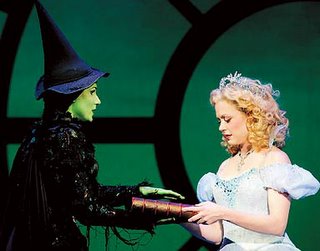
The story explores the lives of two women who came from different backgrounds. Galinda (later to become Glinda the Good) obviously comes
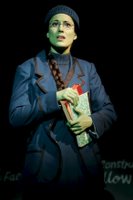 from a priveleged background and charmed life, while Elphaba is despised by her own father and others because she has had the unfortunate circumstance of being born emerald green. Galinda and Elphaba are assigned as roommates in college, and as anyone who's had that experience can attest, it's not always a good match. Galinda is a vaccous, shallow, but popular woman, and Elphaba is smart and sassy, and not at all into what Galinda is into. She has been made to be consciously aware of her limitations her whole life, while Galinda cuts a swathe easily through any room and gains the admiration and sympathy of her peers. Galinda has an inflated view of herself and has appointed herself Elphaba's savior. Elphaba participates in a cause to defend the animals who have been forbidden to speak or have opinions or freedoms out of her obvious identification with them.
from a priveleged background and charmed life, while Elphaba is despised by her own father and others because she has had the unfortunate circumstance of being born emerald green. Galinda and Elphaba are assigned as roommates in college, and as anyone who's had that experience can attest, it's not always a good match. Galinda is a vaccous, shallow, but popular woman, and Elphaba is smart and sassy, and not at all into what Galinda is into. She has been made to be consciously aware of her limitations her whole life, while Galinda cuts a swathe easily through any room and gains the admiration and sympathy of her peers. Galinda has an inflated view of herself and has appointed herself Elphaba's savior. Elphaba participates in a cause to defend the animals who have been forbidden to speak or have opinions or freedoms out of her obvious identification with them.Galinda is not Elphaba's ONLY self-appointed "savior." Madame Morrible, the college's headmistress wants to take her under her wing since she shows an aptitude for sorcery, which also brings her the attention of the Wizard. Morrible and the Wizard have less than noble motives for using Elphaba's talent for sorcery, while Galinda moves from "loathing" her and making her into a project, to becoming her friend (though, in the end, she wouldn't admit this in mixed company).
____________________
Something has changed within me.
Something is not the same.
I'm through with playing by the rules
Of someone else's game.
Too late for second-guessing,
Too late to go back to sleep,
It's time to trust my instincts
Close my eyes: and leap!
It's time to try Defying gravity.
I think I'll try Defying gravity.
And you can't pull me down!
-- Elphaba in the song Defying Gravity
The treatment of Elphaba by Galinda, Morrible, and the Wizard prompt her to reject their rules of their "game." Elphaba chooses to defend the animals and fight Morrible and the Wizard. Galinda must walk the borderline because of politics. These relationships beg the discussion about what evil is. True, there are some individuals that are clearly "evil." But, a large number are clearly labeled as such because they are misunderstood or refuse to play by society's social mores. This is Elphaba's fate. She is misunderstood from the beginning because she is green and labeled evil by the authorities, because she won't participate in what she believes is immoral...and they have enough authority to convince the land of Oz that Elphaba is wicked.
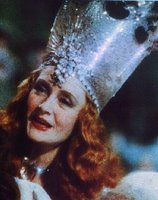
I'll be the first to admit that I identify more with Elphaba than Galinda. Even when I was young, I would watch the performance of Billie Burke as "Glinda the Good Witch" in the film and found her to be vaccous and somewhat sanctimonious. And, while I found Margaret Hamilton's performance as the "Wicked Witch of the West" to be somewhat scary, I found it more endearing and 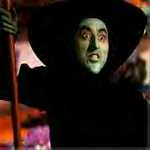 entertaining by the end of the film. There was always something likeable inside the character to me: that crazy laugh and hunched pose, the way she dramatically waved her fingers, her dark humor, and her habitat in the forbidden forest. I guess I saw her as more multi-dimensional than Glinda. Apparently, so did the writer of the story behind Wicked.
entertaining by the end of the film. There was always something likeable inside the character to me: that crazy laugh and hunched pose, the way she dramatically waved her fingers, her dark humor, and her habitat in the forbidden forest. I guess I saw her as more multi-dimensional than Glinda. Apparently, so did the writer of the story behind Wicked.
 entertaining by the end of the film. There was always something likeable inside the character to me: that crazy laugh and hunched pose, the way she dramatically waved her fingers, her dark humor, and her habitat in the forbidden forest. I guess I saw her as more multi-dimensional than Glinda. Apparently, so did the writer of the story behind Wicked.
entertaining by the end of the film. There was always something likeable inside the character to me: that crazy laugh and hunched pose, the way she dramatically waved her fingers, her dark humor, and her habitat in the forbidden forest. I guess I saw her as more multi-dimensional than Glinda. Apparently, so did the writer of the story behind Wicked. Without revealing too much about the plot, there are "cameo" appearances by Dorothy, the Scarecrow, the Tin Man, and the Cowardly Lion (whose origins are all explained). There is a love triangle between Galinda, Elphaba, and Fiyero, who is initially Galinda's kindred spirit and effervescent suitor. There is also a lot of humor and the tightest story I've seen or read in a long time: considering the author was tackling a sacred classic and the two main characters aren't explored much in the original novel or film. The story is clever, fun, meaningful, and touching all at the same time.
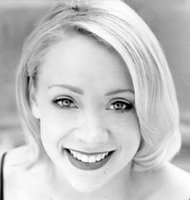

The performance we attended included actors Stephanie Block (Elphaba), understudy Emily Rozek (Galinda/Glinda), Derrick Williams (Fiyero), and David Garrison (the Wizard). Stephanie Block did a fantastic job playing Elphaba, but in my opinion, it was Emily Rozek that stole the show with her interpretation of the character of Glinda. I swear that I knew girls like that in college. She played Glinda in such a way that one could despise her, be annoyed by her, and still find her quite affable at the same time.
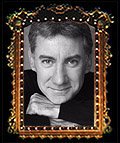
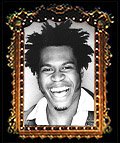
left: David Garrison; right: Derrick Williams
Finally, the set is magnificent in terms of construction, color scheme, and animatronics. Words simply aren't ample to describe the set. One spectacular part of the set is the talking giant, mechanical head of the Wizard. The costuming was a creative mix of Gay 90s attire mixed with derivations of the costuming from the original film. As a lover of the original film, I found it to be a tribute to the story, though I can see why some purists and those who prefer to believe in the polarity of good and evil would find it to be sub-par. Hopefully, most can put aside their preconceived notions and opinions and see Wicked as its own story.
* Lyrics can be found here.
© Stephanie Lewis, 2005

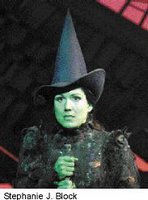

No comments:
Post a Comment